the gastronome: les sourciers in france
I put the call out on Facebook - “I’m going to be in France, does anyone know any female farmers I can interview and photograph?” A few months later I found myself halfway across the world in a high-speed train from Paris to Bordeaux. I would then need to rent a car to make the rest of the trip, winding through vineyards and along ancient stone roads to the Midi-Pyrenees. I was on my way to meet Kristen Bedddard of the Kale Project at the home of Marion Sourdois of Les Sourciers Farm.
The lure of travel led French-born Marion Sourdois to a masters degree in international management and an advertising/media planning job with a French car manufacturer that sent her to destinations from Asia to Argentina. A driven up-and-coming executive who struggled with work-life balance, she decided to return to France and start her own business with new husband Nicolas. Around the same time, Sourdois’ Buenos Aires landlord gave her a tour of his hydroponic farm. One taste of the fresh produce and she knew, despite never having farmed before, that it was her next move.
Our visit began with a meal that Marion had prepared for our arrival, it highlighted the region’s culinary best; a duck confit lasagna and a fresh green salad, harvested that afternoon. A simple meal that will I will remember always and a wonderful prelude to the amazing meals we experienced throughout our visit. The next morning we visited the village’s Wednesday Market. Make no mistake; our visit was meticulously timed so we could visit this famous weekly market. The various vendors gather in the town square of Cathédrale Saint-Pierre de Condom. The Cathedral, built in 1506 is a French national monument. Many of its visitors make their way here on their pilgrimage as it is on the Way of St James, or the Camino de Santiago.
We bought a few tomatoes, melons, fresh feta and a croustade aux pommes that is soaked in the region’s Armagnac for dessert. (See scenes from the market here) We fixed a lunch of fresh pesto pasta, sliced tomatoes, a watermelon, feta, cherry and nicoise salad that we enjoyed on the back patio of Marion’s walled garden while sipping a rosé wine. After lunch and the croustade, we decided to head out to the farm.
The route took us through miles of farmland; vineyards and sunflower farms that dot the landscape like a VanGogh painting. Juxtaposed against lush Gers farmland sits Les Sourciers. A hydroponic greenhouse.
Despite initial reluctance by the area’s chefs, Sourdois has quickly built a reputation and a following. Now she is growing an abundant year-round supply of tomatoes and herbs. She is hosting events for world-class chefs, growing hard-to-find in France vegetables like kale and bok choi and has found her ideal work-life balance.
Second half of the greenhouse is being prepped for future plantings.
Why did you decide to pursue farming?
We felt the need to change our life, the way we worked, our relationship with nature and the way we eat. When we discovered about hydroponic culture we had the missing piece of the puzzle, the “modern” part of agriculture that we where looking for. There is much to discover in this field yet and we can help a lot of people with this kind of culture. The decision was made very fast, kind of spontaneous.
Preparing purple basil - grown initially in soil, then moved to small baskets filled with lava rocks and then placed into the growing system
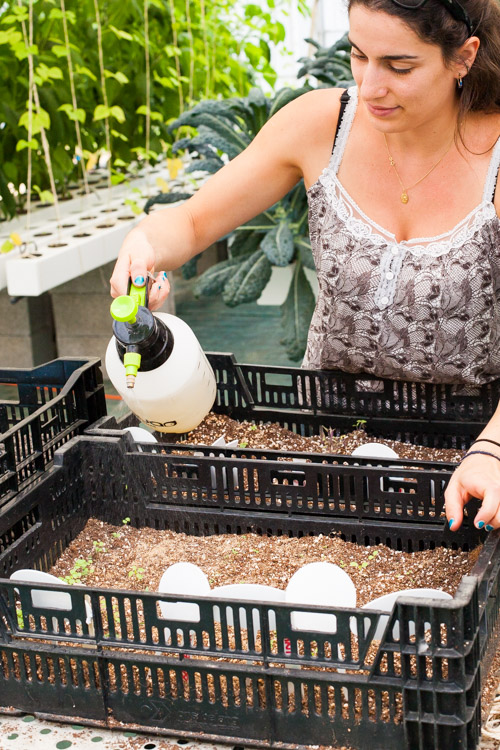
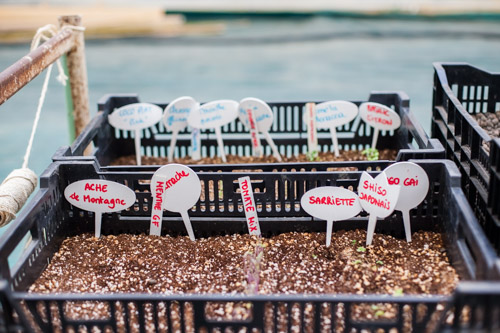
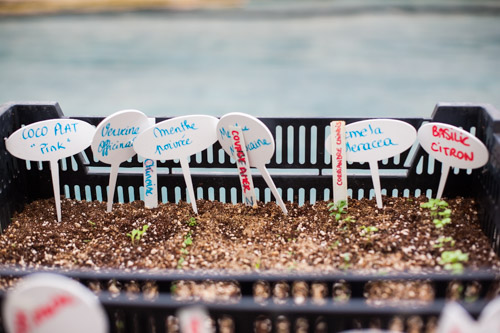
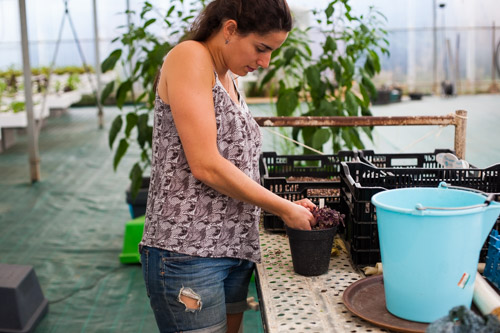
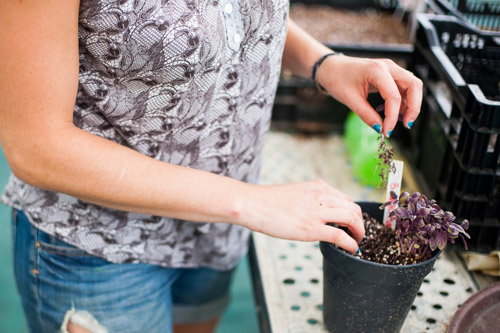
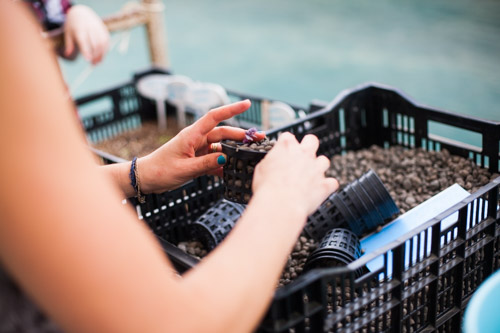
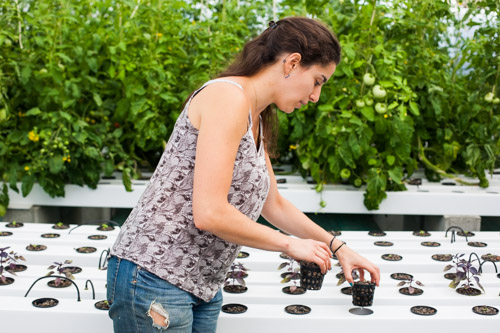
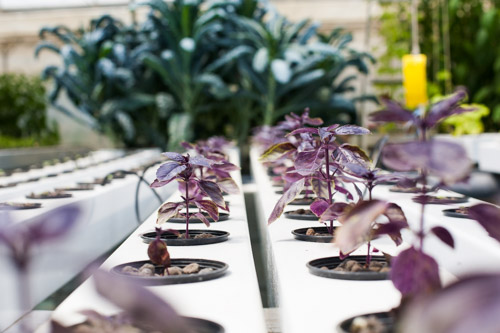
What did you do to prepare/educate yourself for this new role?
A small hydroponic course in Argentina, and a lot of youtube vewing, book reading,… chats with others farmers are the best but as we are new in this area we need time before they can share their world with us.
What skills do you use that you did not expect?
I have to be very patient and tolerant with all our clients that don’t understand that you can not force nature to give you strawberries in winter, or that are mad at us because the winter veggies popped into flowers with this hot spring.
What is your biggest challenge?
There are two: The fact that we did not study about agriculture, we make many beginner’s fails, and we can’t find many tips online or in book.
The other one is the bad image that hydroponic culture has in France, most of the people think it is tasteless and non-ecological, we try our best to show them that it is possible to have very, very tasty products, and that we can absolutely produce tasty greens.
What has been the biggest reward?
Watching the project grow very fast and the healthy plants in our first year of farming.
The greenhouse is open to the elements, including the sudden rainshower
What do you want your food to convey to others?
Real taste. What we eat (and what I ate for 25 years) at the supermarket did not taste like real food. I just never had the chance to realize it.
What does it mean to you to be able to farm?
I take it as an honor and a very big responsibility; it is to take a seed and to be able to do make the best plant out of it. It is also to conserve rare species for next generations.
the roots sit in a water that is infused with micronutrients
Pollinator house in progress
What do you wish people understood about farming?
I’d like them to see how dedicated farmers are to give the best products they can. Often people are surprised that we harvest some herbs one by one, they think machine does it. Also they think is grows all by itself and we just have to harvest in the end. And last but not least, I wish they could see the love and passion farmer put in their work, it is not a plastic factory, it is about animals or plants, there is love.
What are some things we as can do to help create support, equality and awareness for women farmers and small-scale farms?
In France the main problem come from the agricultural chamber that does not recognize our status as farmer because we are too small, it is ridiculous, so we don’t have a regular status. I hope it is better abroad. French government only want us to produce tons of cereals, there are a lot of money for farmers in this field, but not is you want to have a veggie micro farm! Not sure how we could fight this?!
If you could change one thing about our current food system, what would it be?
Eat local, or more local. I find it ridiculous to eat products that come from the other side of the world, people don’t even know what seasons are about, because the find everything in the supermarket. I would put big taxes on products that come from very far away, so people would realize they’d better eat local and seasonal products.
Land access is one of the big challenges to smaller farmers. Do you own your land? Rent? Share?
We currently rent, but yes it is very difficult to own a land in France.
Marion
Thank you to Marion for sharing her story with the Female Farmer Project.
Originally published: April 19, 2016
Comments (5)
Frie Martin 4 months ago
I live fifteen minutes away from this business and have often passed. I'd love to go and have a look inside one day!
Margaux 4 months ago
Thanks Les sourciers for opening us this sustainable farming door!
stephen 5 months ago
Lovely story that well captures her spirit and strength of purpose.
Marion 5 months ago
Really inspiring example for french girls! Thanks for this amazing project!
diana 5 months ago
One new reason to make the pilgrimage:) keep on the great work!
















